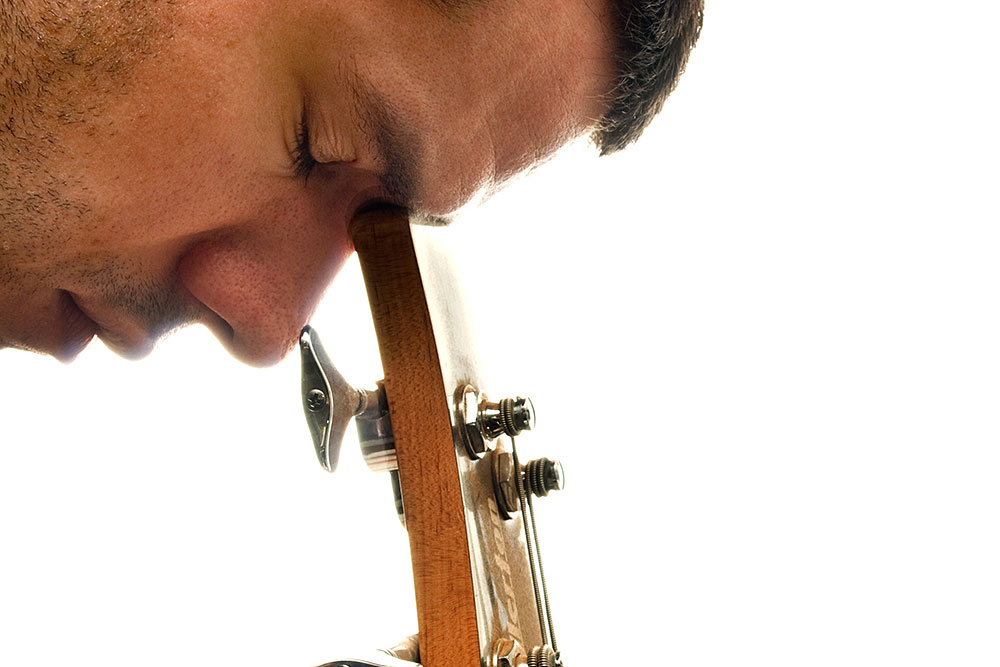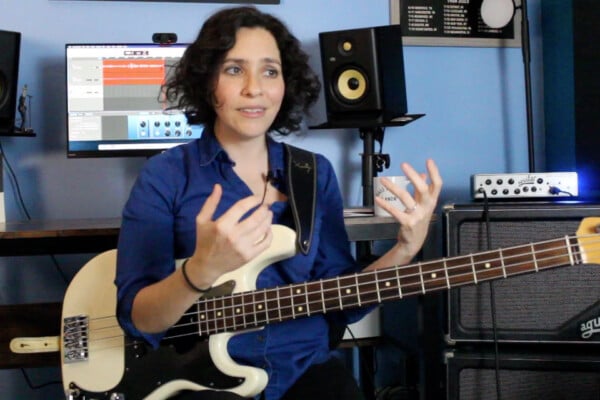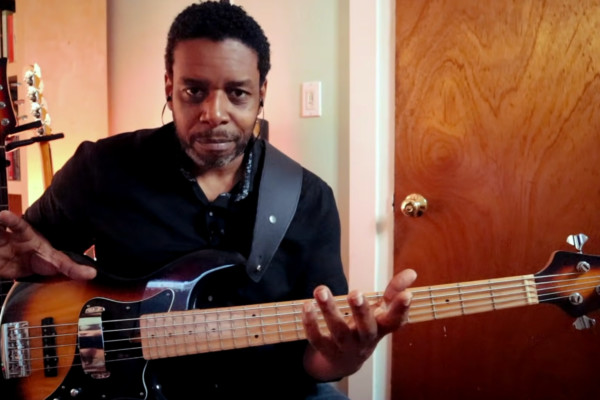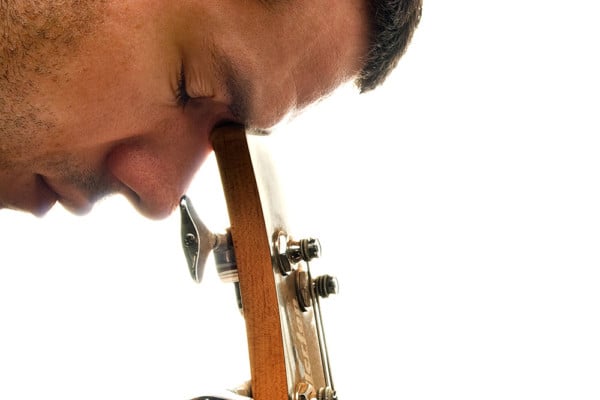Do I Have To Like Jazz To Improve My Playing?

Q: I’ve read some interviews of yours, and you mentioned that when you started studying jazz, you weren’t actually all that into the music, but you came to appreciate it later through study, etc… I’ve been trying to work through standards, exercises through chord changes and bebop/chromatic-type stuff, but I don’t know what I’m trying to achieve, in a way. I want to be able to do stuff on the bass that I hear people doing, but I don’t seem to care about any of the music that is supposed to make me able to do it. Any advice?
A: I think that I know exactly what you mean. I can’t tell you how many students I’ve had who sign up in order to study jazz but don’t actually like the music, and ultimately get frustrated because the information doesn’t seem to stick all that well or apply to what they actually play (I come across this most often in jazz workshops and through the years giving private lessons at a local University).
There is a crucial element to studying any style of music in regard to actually being able to assimilate and make use of the information: Listening!!
I’ve given lessons to actual jazz instructors in other countries who try to teach jazz out of a book but have never even attempted to listen to the music (often because they don’t even know where to look). I have students who get frustrated that their ability to improvise over jazz standards develops so slowly, but they never make the connection to the reality that they are listening to metal, rock or hip-hop when not actually practicing jazz.
More often than not when I meet someone overseas who speaks decent English, if I ask how or where they learned, they will often say, “by watching American movies and TV as well as speaking to English speaking people whenever I get the chance.” The best way to learn is basically through imitation. You listen to hear how it is supposed to sound, you get the flow and shape of the language in your ears, and then you practice and imitate that sound as often as possible. We all know this, but it’s easy to forget to apply it to our own lives.
I’ll often ask a student who they are listening to or who they might try to emulate when playing through a specific tune (especially if their tone, phrasing and/or general approach is wrong for the style or song). I am all too often met with a blank look, followed by an, “Um… I don’t know. I’m just trying to make the changes”.
Imagine how someone might sound if they read about the mechanics of slapping, but never listened to anybody play in that style? Never explored what Louis Johnson, Larry Graham, Marcus, Victor, Flea did to get that sound or figured out any of their grooves (feel free to add the name of anybody else you might dig).
The long and the short of it is this: You absolutely can’t play jazz well if you never listen to jazz. Same goes for any style. If you are going to spend time in the shed working on the material, you also need to spend time studying the sound of what it is you are trying to play. It’s okay if you don’t like the jazz of 60 years ago. It doesn’t have to be Miles to be useful (although I encourage you to give him a shot). It couldn’t be easier to find new music these days with YouTube, and a million different streaming services on our phones.
Search out some playlists, check out some old stuff, new stuff, see what people are doing now that you might dig. If you’re like me, you’ll finally stumble upon something you dig and then slowly develop an appreciation for an ever-broadening selection of artists and related styles.
If you aren’t willing to put in some time listening to the music you are trying to play, you might be wasting some of your time (and money, if you’ve entered into a collegiate program). It’s true that you can’t practice and not get something out of the experience, but it won’t be time efficiently spent. Don’t feel like you have to study jazz to get good at your instrument. There’s nothing wrong with simply pursuing what you love musically, but I would be careful to not limit yourself or sell yourself short. I encourage my students to listen to everything they can get their hands on. Find what speaks to you and chase it.
That said if you hear a player and think, “man… I really want to be able to play like that,” then you should definitely explore what that player studies and who they draw inspiration from. Give it time.
This old metal-head didn’t jump into jazz school, throw on a Brubeck album and find nirvana. I hated most of what I heard for a long time, but I kept exploring different artists from different generations until I found something that I could get down with. And then I got to work!
Throughout the years, my palette has widened more than I ever thought possible. My ears developed more than I thought possible. Now, when I listen to certain things that I used to dislike, I actually hear more than I did back then. There are multiple layers and a lot of depths to any genre, and sometimes it takes us a while to work through them.
You may just need a jumping off point. My transition went something like this: (in a nut-shell, I won’t mention every band I was into, but you’ll get the point).
Slayer -> Pantera -> Janes Addiction – > Weather Report -> Scofield -> Metheny -> Steve Swallow -> Miles “On the Corner” & “Bitches Brew” -> “Kind of Blue” -> Paul Chambers, etc…
Also included in there was Victor -> Tony Rice -> Grisman into a whole world of acoustic music that I never imagined I’d previously enjoy.
You get the picture. It wasn’t immediate. I didn’t think, “I want to learn jazz,” go buy a Charlie Parker album and find everlasting musical happiness. I couldn’t stand that stuff for years after I discovered it. Now, I think it’s astounding.
Your journey will be different, but you just might need to find that jumping off point. Keep your ears open do some digging. The biggest mistake I see students make these days is not listening as deeply as they need to. It’s possibly even harder these days because we are used to just skimming through digital play lists and randomized music apps. I encourage you to get some decent headphones and shut off the world for 45+ minutes at a time and listen to some entire albums. Find something you dig and allow yourself time to take some musical journeys. Find an album you love and wear that thing out! Learn the tunes, read about the players on it, explore what other albums they play on, check out some of those artists. Find the rabbit hole and don’t stop digging.
It’s the easiest thing in the world. To play music well, we need to internalize music well, and one of the absolute best ways to do that is by listening. Go to clubs and seek out a LOT of live music.
Next, the other best way to internalize music is by playing it! Get out there with your friends and try to learn tunes together. Go to jams sessions… whatever it is. Live, eat and breathe music. Just listening and playing with other people causes most of us to make huge strides before you even factor in shed time. It’s crucial. Nobody can just work from a book and practice in a room by themselves and come out the other side well-rounded and musically whole. You may have one or another thing pretty well together, but you’ll be missing some crucial pieces to the puzzle.
Listen, copy, shed, emulate, explore and you will inevitably improve as well as discover much about your own musical identity in the process. Always work with intent and patience.
But yeah, it doesn’t have to be jazz or nothing. Do your thing, just don’t sell yourself short!
Have a question for Damian Erskine? Send it to [email protected]. Check out Damian’s instructional books, Right Hand Drive and The Improviser’s Path.



